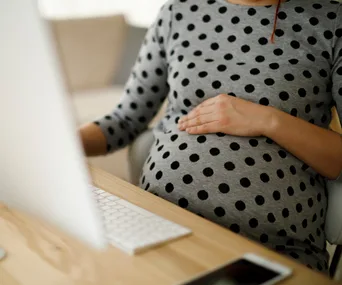Your body
This is the time when you’re most likely to be able to relax and enjoy being pregnant – you should be over any morning sickness and still be completely mobile. Get to know your baby by spending some time every day exploring your bump and sending positive thoughts to your baby boy or girl.
It’s your hormones
Clumsier than usual? No wonder – the extra weight you’re carrying has made your centre of gravity shift. A pregnancy hormone called relaxin – produced by the placenta – is also making your fingers, toes and other joints loosen up. Watch your posture: stand up straight and reduce the risk of a fall by giving up high heels – they make it hard to keep your balance and can cause backache.
Water works
Keep your body working smoothly by drinking extra water to keep up with the increase in your blood volume, which can more than double during pregnancy. As long as your urine is almost clear in colour, you’re drinking enough; if it’s dark, you need to step up your intake.
Your baby
Your baby weighs about 350g and measures 19cm from crown to rump. She is now growing at a rate of about 1cm in length every week.
Small but perfectly formed
While your baby’s body doesn’t look that different from day to day at this stage, inside the details that are essential for the creation of a complete human being are taking place. Her facial features are becoming more defined: her eyelids and eyebrows are now developed, she has tooth buds beneath her gum line, and her rosebud lips are also shaping up nicely. The pancreas (essential for hormone production) is developing steadily.
Watch your mouth!
Your baby’s hearing is now finely attuned, so watch what you say! Some studies suggest that after birth, newborns suck more vigorously when fed if they are listening to music or words they often heard in the womb. Try singing, or reading her your favourite poem or short story.

Check in with your partner as it’s also his journey to fatherhood.
(Credit: Getty Images)How’s he feeling?
Your pregnancy could be affecting your partner more than you realise. According to a Canadian study, reported in New Scientist, dads-to-be can also experience changing hormone levels (including an increase in prolactin, which stimulates milk production), weight gain and fatigue. It’s thought that your behaviour and pheromones (body chemicals) can trigger ‘sympathetic pregnancy’ symptoms in your partner.
Did you know?
Although the softening and stretching of your muscles and joints isn’t exactly a bonus at this stage of pregnancy, later on you’ll appreciate the role played by your changing hormones. They help the ligaments supporting the uterus to expand during labour, and make the bony joints of the spine and pelvis loosen up and become flexible for birth.



